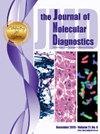VEXAS综合征中UBA1突变的快速筛选和监测。
IF 3.4
3区 医学
Q1 PATHOLOGY
引用次数: 0
摘要
VEXAS(液泡,E1酶,x连锁,自身炎症,躯体)是一种严重的成人发病的自身炎症性疾病,与血液系统疾病相关,如骨髓增生异常综合征。VEXAS主要是由于影响UBA1基因的蛋氨酸41 (p.M41)的获得性突变,该突变存在于bbb90 %的患者中,通常具有很高的负担。治疗策略多种多样,但许多旨在通过低甲基化药物或异体造血细胞移植抑制UBA1突变克隆。在本研究中,我们开发了一种用于快速检测UBA1 p.M41突变的高分辨率熔化工具,用于诊断鉴别,以及三种敏感的实时等位基因特异性寡核苷酸pcr,用于确定p.M41T/V/L突变的变异等位基因频率,适用于疾病的分子监测。本文章由计算机程序翻译,如有差异,请以英文原文为准。
Rapid Screening and Monitoring of UBA1 Mutations in VEXAS Syndrome
VEXAS (vacuoles, E1 enzyme, X-linked, autoinflammatory, somatic) is a severe adult-onset autoinflammatory disease associated with hematologic conditions, such as myelodysplastic syndrome. VEXAS is mostly due to an acquired mutation affecting methionine 41 (p.M41) of the UBA1 gene, which is present in >90% of patients and usually at a high burden. Treatment strategies are diverse, but many aim to suppress the UBA1 mutant clone with hypomethylating agents or by allogeneic hematopoietic cell transplantation. In the present study, we have developed a high-resolution melting tool for rapid detection of UBA1 p.M41 mutations, useful in diagnostic discrimination, and three sensitive real-time allele-specific oligonucleotide PCRs to determine the variant allele frequency of p.M41T/V/L mutations, applicable in the molecular monitoring of the disease.
求助全文
通过发布文献求助,成功后即可免费获取论文全文。
去求助
来源期刊
CiteScore
8.10
自引率
2.40%
发文量
143
审稿时长
43 days
期刊介绍:
The Journal of Molecular Diagnostics, the official publication of the Association for Molecular Pathology (AMP), co-owned by the American Society for Investigative Pathology (ASIP), seeks to publish high quality original papers on scientific advances in the translation and validation of molecular discoveries in medicine into the clinical diagnostic setting, and the description and application of technological advances in the field of molecular diagnostic medicine. The editors welcome for review articles that contain: novel discoveries or clinicopathologic correlations including studies in oncology, infectious diseases, inherited diseases, predisposition to disease, clinical informatics, or the description of polymorphisms linked to disease states or normal variations; the application of diagnostic methodologies in clinical trials; or the development of new or improved molecular methods which may be applied to diagnosis or monitoring of disease or disease predisposition.

 求助内容:
求助内容: 应助结果提醒方式:
应助结果提醒方式:


